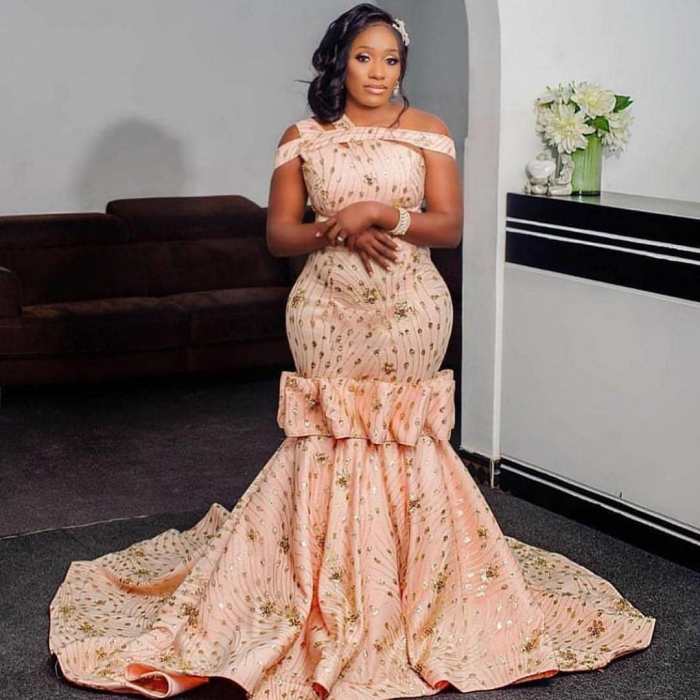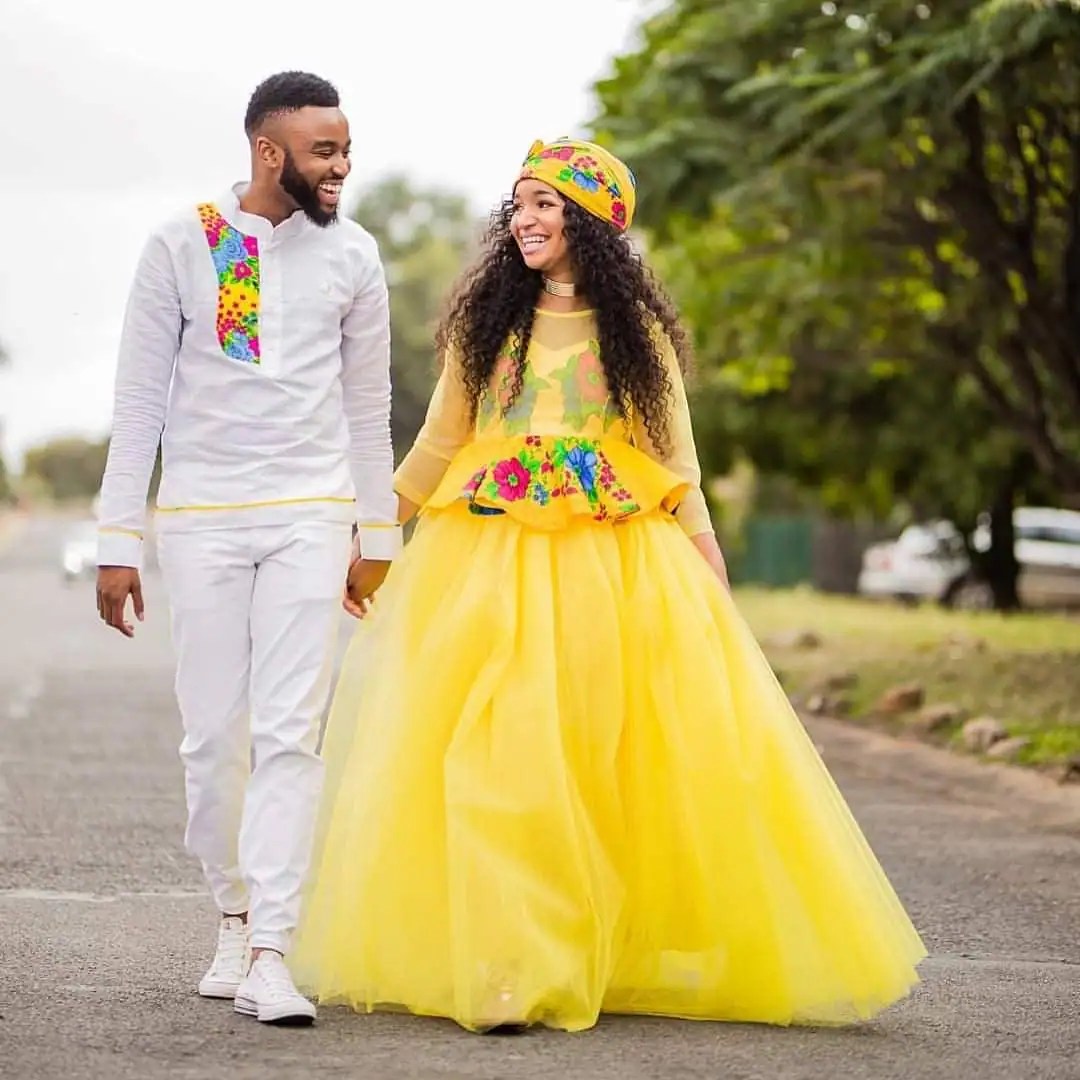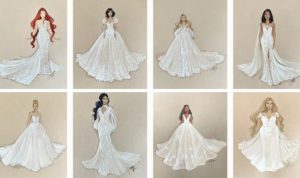African Wear Wedding Dresses: A Celebration of Style and Culture
African wear wedding dress – African wedding dresses represent a vibrant tapestry of cultural heritage, artistic expression, and modern design. From the intricate beadwork of the Kente cloth to the flowing silhouettes of contemporary gowns, these dresses tell a story of tradition and innovation. This exploration delves into the diverse styles, fabrics, embellishments, color palettes, and styling techniques that define the beauty and significance of African wedding attire.
Styles of African Wedding Dresses
African wedding dress styles exhibit remarkable diversity, reflecting the continent’s rich tapestry of cultures and traditions. Regional variations are significant, with each style showcasing unique features in silhouette, fabric choice, and embellishments. For instance, the flowing, elegant styles of West African dresses often contrast with the more structured, form-fitting designs prevalent in some Southern African regions. Modern interpretations blend traditional elements with contemporary design aesthetics, resulting in breathtakingly unique creations.
Three distinct styles offer a glimpse into this variety: the Kente cloth dress (West Africa), characterized by its vibrant woven patterns and often A-line or empire waist silhouettes; the Aso-Ebi style (West Africa), known for its coordinated ensembles in rich fabrics and bold colors, frequently featuring elaborate embroidery or beadwork; and the Shweshwe dress (Southern Africa), distinguished by its striking prints and often fitted bodice with a flared skirt.
Modern interpretations often incorporate elements like lace, tulle, or other contemporary fabrics while retaining the essence of the traditional style. For example, a Kente cloth dress might be updated with a modern sweetheart neckline or a fitted bodice, showcasing the timeless elegance of the fabric in a contemporary context.
| Style Name | Region of Origin | Key Characteristics | Notable Designers (if applicable) |
|---|---|---|---|
| Kente Cloth Dress | West Africa (Ghana, Côte d’Ivoire) | Vibrant woven fabric, A-line or empire waist, often incorporates traditional motifs | Many emerging designers; specific names vary regionally |
| Aso-Ebi Style | West Africa (Nigeria, Ghana) | Coordinated ensembles, rich fabrics (e.g., lace, Ankara), elaborate embroidery or beadwork | Many high-profile and emerging designers within the West African fashion scene |
| Shweshwe Dress | Southern Africa (South Africa, Lesotho) | Striking printed cotton fabric, fitted bodice, flared skirt, often incorporates traditional patterns | Various South African designers specializing in Shweshwe fabric |
Fabrics and Materials Used in African Wedding Dresses
The choice of fabric is paramount in African wedding dress design, often carrying cultural significance and reflecting the bride’s heritage. Traditional fabrics, such as Kente cloth, Ankara, and Shweshwe, are frequently chosen for their rich history, intricate patterns, and durability. These fabrics are often hand-woven or printed using traditional techniques, adding a layer of artistry and cultural depth to the garment.
Natural fabrics like cotton, silk, and linen offer breathability and comfort, particularly suitable for warmer climates. Synthetic fabrics, such as polyester and nylon, provide durability and ease of care but may lack the breathability and luxurious feel of natural fibers. The choice between natural and synthetic fabrics often depends on factors like budget, climate, and personal preference.
Fabric Swatch Chart (Descriptive):
- Ankara: A vibrant, printed cotton fabric with bold patterns and a medium weight, offering a good drape and suitable for various styles.
- Kente Cloth: A hand-woven silk and cotton fabric with intricate patterns and a luxurious feel, ideal for structured or A-line gowns.
- Shweshwe: A printed cotton fabric with striking designs and a crisp hand, suitable for fitted bodices and flared skirts.
- Lace: A delicate fabric with intricate patterns, adding elegance and sophistication to various dress styles. Can be used for overlays or accents.
- Silk: A luxurious natural fiber with a smooth, lustrous finish, ideal for flowing silhouettes and elegant details.
Embellishments and Adornments in African Wedding Dresses
Embellishments play a vital role in enhancing the beauty and cultural significance of African wedding dresses. Beadwork, embroidery, appliqué, and other adornments add intricate detail and often hold symbolic meaning within specific African cultures. Traditional embellishments often reflect ancestral motifs, storytelling, or spiritual beliefs, while modern embellishments offer a blend of tradition and contemporary design.
- Beadwork: Intricate patterns and designs created using beads, often representing wealth, status, or spiritual protection.
- Embroidery: Detailed stitching using thread, creating intricate patterns and designs, often incorporating traditional motifs.
- Appliqué: Attaching fabric pieces to create decorative patterns or designs, adding texture and visual interest.
- Sequins and crystals: Adding sparkle and glamour to the dress, often used in modern interpretations.
- Traditional motifs: Incorporating culturally significant symbols and patterns, reflecting the bride’s heritage.
Color Palettes and Symbolic Meanings in African Wedding Dresses, African wear wedding dress

Source: staticflickr.com
Color choices in African wedding dresses are far from arbitrary; they often carry deep cultural significance, reflecting traditions, beliefs, and social status. Specific colors can symbolize fertility, prosperity, joy, or spiritual protection. These symbolic meanings vary across different African communities, adding layers of cultural richness to the attire.
Color Palette Examples (Descriptive):
- Rich Jewel Tones (Burgundy, Emerald, Sapphire): Representing wealth, royalty, and sophistication. Often used in formal, elegant styles.
- Vibrant Earth Tones (Terracotta, Gold, Ochre): Symbolizing fertility, connection to the earth, and abundance. Common in more traditional designs.
- Bright and Bold Colors (Coral, Turquoise, Fuchsia): Representing joy, celebration, and vitality. Often seen in contemporary interpretations.
Accessories and Styling for African Wedding Dresses

Source: akamaized.net
Accessories are crucial in completing the look of an African wedding dress, enhancing its cultural significance and adding a personal touch. Headwraps, often intricately styled, are a significant element, adding elegance and reflecting cultural identity. Jewelry, from delicate necklaces to bold statement pieces, complements the dress and adds a touch of personal expression. Footwear choices range from traditional sandals to elegant heels, depending on the overall style and preference.
Styling an African wedding dress involves careful consideration of the dress style, fabric, and embellishments. For instance, a Kente cloth dress might be paired with simple gold jewelry and a traditional headwrap, while a modern Aso-Ebi style might be accessorized with statement earrings and heels.
African wear wedding dresses offer a vibrant and unique alternative to traditional styles, showcasing rich cultural heritage through intricate beadwork and bold colours. While these dresses may not always reach the price point of the most expensive wedding dress, as seen on this list of most expensive wedding dress designs, their cultural significance and individual craftsmanship often make them equally, if not more, valuable to the wearer.
Ultimately, the true value of a wedding dress lies in its personal meaning and its ability to reflect the bride’s style and personality, regardless of cost.
Questions Often Asked: African Wear Wedding Dress
What is the average cost of an African wear wedding dress?
The cost varies greatly depending on the designer, fabrics, embellishments, and complexity of the design. Prices can range from a few hundred to several thousand dollars.
Where can I find a designer or tailor specializing in African wedding dresses?
You can search online directories, attend bridal shows, or seek recommendations from wedding planners or other brides who have worn similar attire. Social media platforms are also excellent resources.
How do I care for my African wear wedding dress after the wedding?
Professional dry cleaning is usually recommended, especially for delicate fabrics and intricate embellishments. Always follow the care instructions provided by the designer or tailor.
Can I incorporate elements of my own cultural background into an African-inspired wedding dress?
Absolutely! Many brides blend traditional African styles with elements from their own heritage to create a truly unique and personal look. This fusion often results in stunning and memorable designs.


